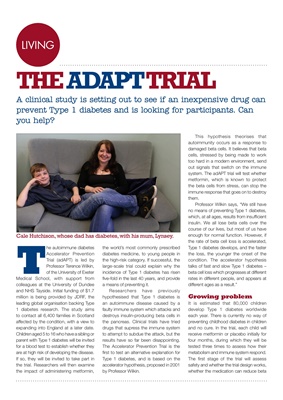
LIVINGLIVING
A clinical study is setting out to see if an inexpensive drug can
prevent Type 1 diabetes and is looking for participants. Can
you help?
THE ADAPT TRIAL
T
he autoimmune diabetes
Accelerator Prevention
Trial (adAPT) is led by
Professor Terence Wilkin,
of the University of Exeter
Medical School, with support from
colleagues at the University of Dundee
and NHS Tayside. Initial funding of $1.7
million is being provided by JDRF, the
leading global organisation backing Type
1 diabetes research. The study aims
to contact all 6,400 families in Scotland
affected by the condition, with a view to
expanding into England at a later date.
Children aged 5 to 16 who have a sibling or
parent with Type 1 diabetes will be invited
for a blood test to establish whether they
are at high risk of developing the disease.
If so, they will be invited to take part in
the trial. Researchers will then examine
the impact of administering metformin,
the world's most commonly prescribed
diabetes medicine, to young people in
the high-risk category. If successful, the
large-scale trial could explain why the
incidence of Type 1 diabetes has risen
five-fold in the last 40 years, and provide
a means of preventing it.
Researchers have previously
hypothesised that Type 1 diabetes is
an autoimmune disease caused by a
faulty immune system which attacks and
destroys insulin-producing beta cells in
the pancreas. Clinical trials have tried
drugs that supress the immune system
to attempt to subdue the attack, but the
results have so far been disappointing.
The Accelerator Prevention Trial is the
first to test an alternative explanation for
Type 1 diabetes, and is based on the
accelerator hypothesis, proposed in 2001
by Professor Wilkin.
This hypothesis theorises that
autoimmunity occurs as a response to
damaged beta cells. It believes that beta
cells, stressed by being made to work
too hard in a modern environment, send
out signals that switch on the immune
system. The adAPT trial will test whether
metformin, which is known to protect
the beta cells from stress, can stop the
immune response that goes on to destroy
them.
Professor Wilkin says, "We still have
no means of preventing Type 1 diabetes,
which, at all ages, results from insufficient
insulin. We all lose beta cells over the
course of our lives, but most of us have
enough for normal function. However, if
the rate of beta cell loss is accelerated,
Type 1 diabetes develops, and the faster
the loss, the younger the onset of the
condition. The accelerator hypothesis
talks of fast and slow Type 1 diabetes -
beta cell loss which progresses at different
rates in different people, and appears at
different ages as a result."
Growing problem
It is estimated that 80,000 children
develop Type 1 diabetes worldwide
each year. There is currently no way of
preventing childhood diabetes in children
and no cure. In the trial, each child will
receive metformin or placebo initially for
four months, during which they will be
tested three times to assess how their
metabolism and immune system respond.
The first stage of the trial will assess
Cale Hutchison, whose dad has diabetes, with his mum, Lynsey.